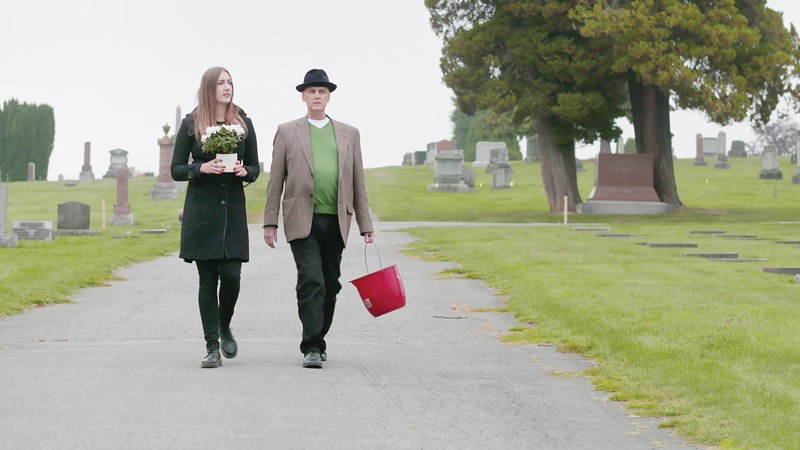For Dear Life, Centennial Theatre, Sept. 14, 7 p.m. Documentary will be followed by a discussion with panelists Dr. Paul Sugar (palliative care physician), Dr. Marylene Kyriazis (cofounder and CEO Paul Sugar Palliative Support Foundation) and Carmen Pollard (film director). For more information visit fordearlife.ca.
The film opens with James Pollard building a long, wooden structure.
The sound of saws, hammers and boards being put into place make up the early moments. Measurements are made and penciled in with precision. People are at work.
It looks innocuous enough, that is until the viewer clues in that Pollard’s making the box to fit rather specific – and seemingly personal – parameters.
It’s a coffin, and he’s the willing recipient.
He comments with sly humour that the wooden frame has “plenty of room.”
Although it’s jarring to see someone preside over what’s ultimately going to be their final resting place, Pollard prefers to refer to it instead as his “last project.”
And what a project it is.
In For Dear Life, which premiered at the DOXA Documentary Film Festival, Carmen Pollard chronicles the final years of her cousin’s life.
James passed away almost a year to the day the film had its sellout run at the film festival back in May.
“I think the reason people came out to watch the film is that there is a real yearning to change the way we perceive and talk about death and dying,” Carmen explains. “It was James’s hope that his story might have an impact on how we view death in our culture, by inspiring others to not only engage in the dialogue, but also have more agency around their own personal approach.”
A few years after James’s initial prostate cancer diagnosis that came with a terminal notice, Carmen and James decided to make a film about his remaining time.
She says she was initially struck by how forthcoming James was about his prognosis.
“When he was first diagnosed, I’m talking way before I was filming, I was really taken aback by how much he insisted on being open about it,” she says. “I was really taken aback by it and at first it actually made me quite uncomfortable.”
But that discomfort soon gave way to curiosity. Both Carmen and James became intrigued by just how dismissive the culture at large was to the dying process, and they set out to turn that dismissiveness into something more death-positive.
“He was a theatre guy,” Carmen explains. “He really saw the world through a theatrical lens and so it began to occur to me that life itself sort of could be a performance for him and that some of his ideas around his end of life process were actually quite theatrical.”
For Dear Life leaves little unturned as it goes about chronicling the final four years of James’s life.
During that time, the viewer gets to go along with James as he interacts with his family, friends and a host of caregivers. Moments of raw clarity, humour and sadness ensue.
“It’s inviting our culture to be openly engaged in the dying process,” Carmen says about the film and its push towards embracing a death-positive movement.
A large portion of the film is devoted to James deciding on his burial wishes for after he dies.
His desire to be buried like a “bog man,” encased in clay in order to better preserve his body, gives the film some levity – and certainly adds to James’s reputation for having a theatrical flair – but it also makes an important point about end of life scenarios that these days are a large part of the popular conversation: the right to choose.
“The way he chose to die might not be the way that you or I might choose to die,” Carmen says, but accepting people’s different outlooks is just part of the process.
Dr. Paul Sugar has been providing palliative care for more than 35 years at Lions Gate Hospital. He was James’s palliative care doctor and is also featured extensively in the documentary.
He says with admiration that Carmen really captured the important part of her cousin’s story.
“I’m a strong believer in the value of life,” Sugar explains. “The fact that he maintained his humanity, he maintained his desire to live, he maintained his interest in everything during that time and during that decline, even though it’s very hard to watch, it’s very inspiring.”
While James’s slow physical decline over the course of the film is shocking, Carmen adds that it was important to show James’s transformation from early diagnosis to end of life because it’s important to be around those that our dying.
It’s those moments, she says, that teach us the value of life – and not to shun death in the tightly-lipped way our culture currently does.
“I think it’s important to see people as living until they die, not as their life being over once they’re diagnosed.”



